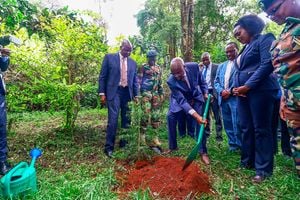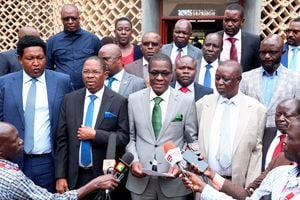Kenya reviews ties with African states

Foreign Affairs Cabinet Secretary Monica Juma, flanked by United Kingdom Trade Minister Greg Hands, addresses a news conference at Intercontinental Hotel, Nairobi, on April 12, 2018. Kenya wants to strengthen its ties with other nations. PHOTO | ANDREW KILONZI | NATION MEDIA GROUP
What you need to know:
- In January, 23 African countries launched a single aviation market aimed at ending decades of government protectionism in the sector.
- President Kenyatta has been particularly vocal on the need to ease movement and actualise the dream of the pan-Africanists.
The government is reviewing its diplomatic relations with African countries to enhance regional trade and strengthen the Kenyan passport, Foreign Affairs Cabinet Secretary Monica Juma has said.
Of importance is how Kenyans will benefit from the Continental Free Trade Area deal signed by 48 African leaders in Kigali, Rwanda, in March, as well as how President Uhuru Kenyatta’s open skies policy could be used to advance his pan-Africanism agenda.
President Kenyatta in November last year lifted visa restrictions on all African nationals visiting Kenya, and Ms Juma says that, although Nairobi will not demand reciprocity, it will keep pushing for the easing of cross-border barriers within the continent, “in the spirit of integration”.
VISA
Already, South Africa has eased visa restrictions on Kenyan students, and Ms Juma said discussions are under way to extend the benefits to other Kenyans.
Stringent visa restrictions by South Africa against Kenyans in recent years have extended to the issuance of work permits, forcing many professionals to relocate.
“The key objective now is to bring together the wealth of Africa to speak to the needs of Africa,” she said in an interview with the Nation.
“The free trade area is important because it promises one-Africa platform, which surpasses the barriers of our histories.”
Kenya ratified this agreement on Thursday last week, Ms Juma added, and will deposit it at the African Union headquarters in Addis Ababa, Ethiopia, in the coming weeks.
AVIATION
The next step in this grand pan-African ambition is the reduction of the cost of air travel within the continent, which could mean licensing of smaller carriers as well as easing tax.
In January, 23 African countries launched a single aviation market aimed at ending decades of government protectionism in the sector, high tax regimes, as well as stringent regulations.
The Single African Air Transport Market agreement, launched in Addis Ababa, will enhance flight frequencies between nations, lower fares and enhance passenger capacity.
It comes nearly 20 years since the Yamoussoukro Decision of 1999 to expand intra-African aviation routes.
PASSPORT
Kenya, along with South Africa, Nigeria, Ethiopia, and Rwanda, were among countries that signed the agreement, and Ms Juma said African ministers of Transport are discussing the potential of an African passport, which would replace the country-specific documents.
President Kenyatta has been particularly vocal on the need to ease movement and actualise the dream of the pan-Africanists who founded the Organisation of African Unity in 1963.
In his inauguration speech in November last year, he said the free movement of people on our continent “has always been a cornerstone of Pan-African brotherhood and fraternity”.
“The free we are to travel and live with one another, the more integrated and appreciative of our diversity we will become,” he said adding:
“The political balkanisation that risks our mutual security, the negative politics of identity, will recede as our brotherhood expands to embrace more Africans.”
Among the hurdles Ms Juma will have to deal with is the security threat of an increasingly fragmented Somalia and a politically tense South Sudan.




